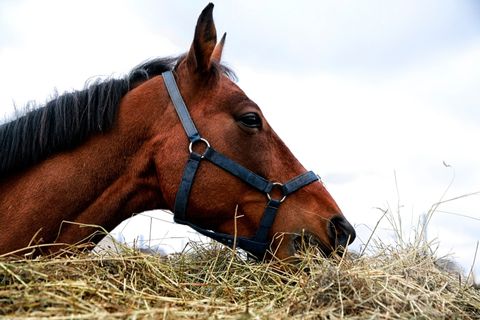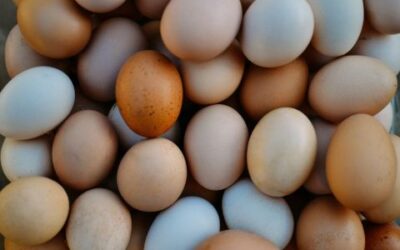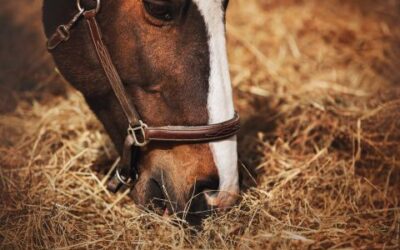 High protein diets are often come recommended for horses (and humans!) for a variety of reasons. These diets can help to build muscle and body condition while providing horses with the energy that they need to compete. Many equine nutritionists recommend supplementing your horse’s forage with alfalfa chopped hay in order to increase their protein intake. This is because the protein levels in alfalfa hay can reach up to 21%, while traditional grass hays have protein concentrations around 10%.
High-protein diets are extremely beneficial, especially for the athlete, but they come with a surprising side effect. Did you know that high-protein diets for horses can produce extra ammonia? Unlike other nutrients, like fat and carbohydrates, the horse’s body does not store protein for later use. In fact, too much protein in the horse’s diet results in excess nitrogen end products, such as ammonia and urea, as the kidneys perform their duties.
In order to counteract this, a diet containing higher-than-necessary protein levels for your horse will require additional water, as urine output will also need to increase. The horse’s body will naturally flush the excess ammonia and urea from its system.
This process of filtering out the extra ammonia has no ill-side effects for a healthy horse—that is, until it has ended up in your horse’s stall. The accumulation of ammonia in horse stalls, barns, and paddocks is more than an odor nuisance. Studies have concluded that low levels of ammonia stress a horse’s upper respiratory airways, placing them at risk of pneumonia, heaves, and other serious illnesses. It is important to realize that these horses may need additional bedding, more consistent stall cleaning, and even more time in turnout. Managing a high-protein diet for horses is easy, but it requires that the consideration of ammonia be at the forefront of your thinking.
High protein diets are often come recommended for horses (and humans!) for a variety of reasons. These diets can help to build muscle and body condition while providing horses with the energy that they need to compete. Many equine nutritionists recommend supplementing your horse’s forage with alfalfa chopped hay in order to increase their protein intake. This is because the protein levels in alfalfa hay can reach up to 21%, while traditional grass hays have protein concentrations around 10%.
High-protein diets are extremely beneficial, especially for the athlete, but they come with a surprising side effect. Did you know that high-protein diets for horses can produce extra ammonia? Unlike other nutrients, like fat and carbohydrates, the horse’s body does not store protein for later use. In fact, too much protein in the horse’s diet results in excess nitrogen end products, such as ammonia and urea, as the kidneys perform their duties.
In order to counteract this, a diet containing higher-than-necessary protein levels for your horse will require additional water, as urine output will also need to increase. The horse’s body will naturally flush the excess ammonia and urea from its system.
This process of filtering out the extra ammonia has no ill-side effects for a healthy horse—that is, until it has ended up in your horse’s stall. The accumulation of ammonia in horse stalls, barns, and paddocks is more than an odor nuisance. Studies have concluded that low levels of ammonia stress a horse’s upper respiratory airways, placing them at risk of pneumonia, heaves, and other serious illnesses. It is important to realize that these horses may need additional bedding, more consistent stall cleaning, and even more time in turnout. Managing a high-protein diet for horses is easy, but it requires that the consideration of ammonia be at the forefront of your thinking.3 Tips for Protecting Your Spring Season Crops
Spring is on its way! You know what that means, it’s time to plan your gardens and begin to plant some hardy...




